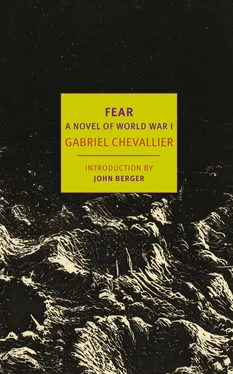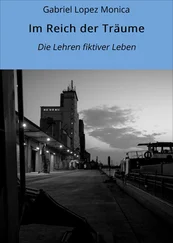‘So, there we are! Enjoy your stroll, old chap!’
‘Thank you, sir,’ I say in the normal tone of a subordinate.
These are the childish amusements we still get up to in August 1918! Good lord, I am sure that if I had commanded a company my men too would have said: ‘That Lieutenant Dartemont, he’s got guts!’ It is true that perhaps I would then have been killed a long time ago…
Two surprise attacks have shaken the sector.
One evening at sunset, outside the battalion’s deep shelter, we were happily assembling our bags ready to be relieved later that night. Some men had already put their gear on the road below where the trucks would arrive.
Machine-gun fire overhead makes us look up. Above the German lines two aeroplanes are ducking and diving round each other and exchanging fire. Everyone’s attention is fixed on the sky. Before choosing our preferred victor, we are all peering to see which one has our colours…
Rrrran, rrrran, rrrran, rrrran, vraouf, vraouf, vraouf-vraouf… Bombardment, earth shaking… Vououou… 150s coming straight at us. We throw ourselves down the steps of the sap, tumble down into the depths of the shelter… We are overcome with the stunned stupor that always accompanies the start of an attack, gripped by terror. The dark question rises up from the depths where it slumbered: ‘Is this the hour?’ We look at each other, mutely: ‘Who’s it going to be? Who’ll be hit in the next second?’ And then the silent prayers, the refusal: ‘no, no, not me!’ We are extremely shaken. Heavy shells are exploding right outside the entrances to the shelter, the trench has been targeted exactly, the acrid smoke comes down in waves and makes us cough. Now, we are eight hundred metres behind the front lines. Such deep shelling makes us fear some major attack.
The telephone rings. The commandant answers:
‘Yes, sir, we’re getting it… don’t know yet… on the right especially… Yes, sir… I’ll keep you informed.’
Will men be sent out?… The dull rumbling tears at our chests, the accurate shelling makes it hard to stop shuddering.
‘Runners!’
The adjutant peers through the darkness. In a corner there is a short argument: the runners are defending their lives. ‘It’s not my turn to go… Not mine either.’ And then the judgement is passed: ‘You and you.’ Four men set off for the companies, breathless even before they have started running. We look away as they pass to hide our shameful joy: any of us might have been chosen… They wait on the top steps. After a burst of firing, they take a deep breath, throw themselves outside, heads down, like divers.
We wait for them to come back. It will take a good half-hour.
Two runners arrive from the 9th and one of them, white-faced, is wounded. Lieutenant Larcher sends the news that everyone is at his post and that there is no sign of the enemy.
The telephone rings again. In the rear, the colonel is getting impatient, under pressure himself from divisional command. The runners shake with fear and try to hide. But the commandant has the good sense just to grumble, ‘Let them come and look for themselves if they’re in such a hurry!’ and not to risk the lives of more men.
We spend another twenty minutes wondering whether the Germans are not about to arrive…
Then we notice that the bombardment is slowing down.
‘All over!’ says the adjutant.
Chests heave deep sighs of relief, the tension falls. A little later, other runners bring the first reports. The enemy penetrated the front-line trenches of the 10th and took some prisoners, we don’t yet know how many. The lieutenant will send details as soon as he’s clarified the situation.
In the meantime we go to look at the damage. It is night outside. The trench has caved in and we get stuck in the churned-up soil. The front is silent, the evening chilly. We worry again about when we will be relieved.
Finally the company report arrives. We can reconstruct the progress of the attack. The aerial combat had been a fake so as to distract the attention of our look outs. Assault troops had been massed in abandoned trenches between the lines. At the first explosions, they surged out, rushed to our lines, surrounded a detachment of machine-gunners and threw grenades into a dugout. Our casualties were eight missing, three dead and seven wounded. One of the dead had just been given leave and was to have set off the next day to get married.
No problem as far as the dead and wounded are concerned: their names are added to the profit and loss sheet. But command cannot accept that men disappear, cannot accept the surprises or hazards of war. Someone must be responsible. The machine-gun officer and the company commandant are both incriminated and they turn against each other. The former claims that ‘the infantry gave no support to my machine-gunners.’ The latter replies that ‘the machine-gunners should have given covering fire to my men.’ The actual truth was simple: the Germans had come up with a plan that they executed with precision, leaving our squads no time to organise any defence. At the start of any engagement there is always a degree of wavering and they profited from it. Their success was regrettable but deserved, and the combatants, who are impartial, agree on this. One would not be able to give such an explanation to the men at the rear. Blamed by divisional command, the colonel lets the battalion leader know of his displeasure and he then takes his revenge on the company commandants. Blame cascades down through the ranks and ends up, as always, on the back of the soldier. But the soldiers take this philosophically. ‘One thing’s for sure, and that is that those lads who went off with the Boches have had their lives saved!’ Whereas the three dead are indeed dead. In a hut at camp I heard Chassignol discussing the events in measured terms, a water bottle of wine in his hand:
‘If the old colonel reckons he’s smarter than me at the look out, he can have my gun any time he likes. Then he can thrash it out with Fritz!’
‘If they ain’t pleased with our work then all they got to do is pension us off!’ said another.
‘Ha, they’ll pension you off with a dozen bullets in your guts, you stunted foetus! Rest homes and pensions are nice little fiddles for invalids!’
‘And why wouldn’t I be an invalid?’
‘Because you ain’t anything. You’re nothing. Nothing! You’re part of the quota , just a tool, about as much as a shovel handle. If you’re still alive, it’s because the shells couldn’t be bothered with you!’
We had a score to settle with the enemy. It had to be done. The battalion prepared a surprise attack which took place a fortnight later. The affair cost us several wounded and thousands of projectiles. But the Germans had known only too well that a riposte was coming and had evacuated their trenches as soon as we fired the first shells.
Latterly the division has been made up of two French regiments and one regiment of American blacks. We encounter them in rest periods because their camp is next to ours. The poilus fraternise with their new brothers in arms. Blacks and whites sit together drinking the heavy wine they serve out in the canteens, and swop bits of equipment. The Americans are more generous, being better off. They are holding a sector on our left but I have stopped going there because it is so dangerous. They keep all their weapons ready to shoot, safety catches off, whether it is revolvers in their pockets or rifles propped up against the wall of a shelter. If one gets dropped, it goes off. If someone gets killed, it is an inevitable accident of war, something of which they only have a vague notion. They came to France like they would set off to the lands of Alaska or Canada, to become gold prospectors or fur trappers. They go out on crazy, boisterous patrols in front of their lines, making a lot of racket, something which does not always turn to their advantage. They throw grenades like fireworks at a festival. They have hung up tin cans on their barbed wire and fences at which they shoot from every direction. Behind the line there are bullet holes everywhere, from American bullets.
Читать дальше












